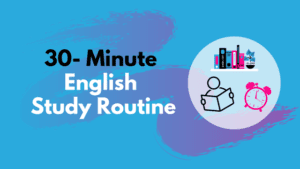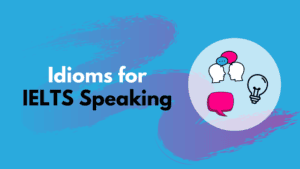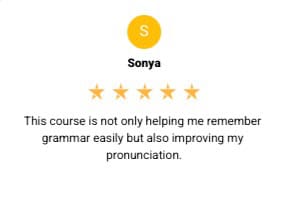Useful Idioms for IELTS Speaking
In this article, I will showy you lots of useful idioms for IELTS Speaking that you can use for any topic.
Idioms are important because they help you understand natural English, and also because to get a Band 7+ in IELTS Speaking you need to use ‘some less common and idiomatic vocabulary’
Many students find idioms a challenge –
Which do I learn?
How do I use them?
Well there are thousands of them, and I suggest you should learn 1 idiom a day as a regular part of your daily English diet.
Rather than going to lists, I would note them as you hear them in context, such as a podcast or TV series.
Table of Contents
Idioms for expressing opinions
In IELTS Speaking you are often asked to give your opinion on a topic, and there are different idiomatic expressions you can use to express your opinion.
Let’s take the following question:
Many governments are investing in space travel. What do you think about this?
You could reply with either of the following,
My take on this is, it’s a good idea
To my way of thinking, it’s a good idea
If you are unsure about your opinion, you could say one of the following;
I’m in two minds about this.
I’m on the fence.
If you want to talk about one most important idea, you can use the expression,
It boils down to + noun = the most important thing is _____
For example,
It boils down to money. Can we afford to invest in space exploration? I don’t think so.
Or you might say,
It boils down to one thing, our planet is in danger, so we need to explore space.

Idioms for expressing likes and dislikes
Very often in the test, you are asked whether you like something or not.
For example,
Do you like your job / football / fast food? (Single nouns)
Here are some useful idioms for IELTS Speaking that you can use in this case. The first is to say you like it, the second is if you don’t care or you are indifferent, and the third is to say you don’t like it.
It’s the bees knees = I love it
I can take it or leave it = I don’t care / mind
It’s not my cup of tea = I don’t like it
Idioms for expressing confusion
Some topics in IELTS Speaking can be confusing and you may not honestly really understand them.
For example,
That’s fine, you just need to say you don’t fully understand them, or you find them confusing.
This is a great opportunity to show off your language. If the examiner asks,
What do you think of Artificial Intelligence?
You can try the following:
I can’t make head or tail of it (GB)
I can’t make heads or tails of it (US)
I can’t get my head around it

Introducing people in IELTS speaking part 2
In IELTS Speaking Part 2, you may need to talk about a person, maybe some you like or admire.
Instead of saying,
I’d like to talk about my father
You could say,
The person I want to talk about is none other than my father
‘none other than’ is used to introduce someone that might be a surprise to the listener.
Idioms for saying things are good
As mentioned above, in Part 2, you may have to talk about a person, or possibly a place, an activity or a thing.
If you want to describe any of these as good, you can use the following expressions,
______ is hands down the best
________ is second to none
______ is a cut above the rest
I think the world of ________
Here are some specific examples:
Harry Kane is hands down the best football player in England
My Maths teacher is so good, she is second to none
Samsung phones are a cut above the rest
I think the world of my father
Idioms for saying things are normal
If on the hand, you want to describe a person, place, activity or thing as normal, nothing special, you can say,
It’s a run-of-the-mill restaurant
This hotel is ok, but nothing to write home about

Idioms for saying things are not good
Finally, some things may not be good at all. When we want to compare 2 things or people, saying one is not as good as the other, we can say,
It is not a patch on ______ = It’s not as good as ______
It can’t hold a candle to ______ = It’s not as good as ______
Here are some specific examples:
The latest Marvel film is not a patch on the previous film.
This restaurant is not a patch on the one we went to last week
This singer is ok, but she can’t hold a candle to Beyoncé
I hope you will find these idioms useful for your IELTS Speaking test.
Remember, always learn idioms in context, and just learn 1 or 2 a day.
Idioms are fun because they help you add colour, metaphor and humour to your speech. This is why they are used a lot in the news, or by politicians to make their speech more attractive.
Think of them as a the salt or pepper of your speech, they add flavour.
Don’t overuse them in your speech, it won’t sound natural – too much salt will ruin the flavour of your speech!
Which idiom are you going to learn and try using? Leave me a comment below and let me know.
Improve your Speaking Skills with this Free Course
Crack IELTS Speaking Part 1
Learn to Speak with Confidence in Part 1 of Your IELTS Test!
⭐️⭐️⭐️⭐️⭐️
‘It’s such a great course. I’ve learned so many usages for speaking part 1.’
Zu Htet






7 thoughts on “Useful Idioms for IELTS Speaking”
Pingback: 15 Simple Phrases to Make You Sound More British - The KA Academy
Mr Keith you are awesome! you helped me a lot. I don’t know how I can appreciate you. Thanks a million.
My pleasure to help you!
Mate, i just can’t put it into words how much your lessons mean to me. Since I started watching your vids, my speaking fluency just got its speed. To be honest, I’ll always be grateful to you. Thanks a million, Keith.
My pleasure, I am so pleased it can help you. Thanks for letting me know (also very motivating for me)!
Hi Keith, hope you are fine. Thank you very much for giving us a bunch of knowledge and inspiring us. You are such a wonderful teacher. Love you so much.
Can you please send me your lesson PDFs via email?
Thanks again!
Thanks for the comment. I am afraid I cannot send the PDFs via email, but they are all available for download freely on the website.